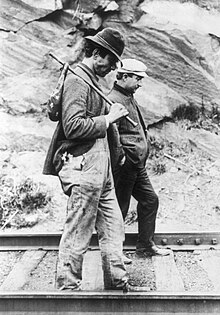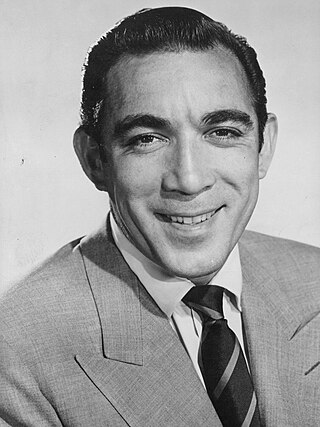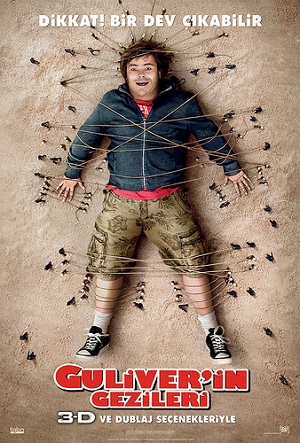Hobo

Hobo, göçmen işçi ya da evsiz avare gezen beş parasız kimse. Terim ABD'de batıda, büyük olasılıkla kuzeybatıda 1890 yılında ortaya çıkmıştır.[1] Serserilerin aksine hobolar seyyar işçilerdir.[1][2]
Kültür

| Hobo terimleri | Açıklama |
|---|---|
| Konaklama arabası | yük vagonu |
| Angellina | genç deneyimsiz çocuk |
| Kötü yol | bazı hoboların kötü davranışlarından işe yaramaz hâle gelen tren yolu |
| Banjo | (1) küçük taşınabilir kızartma tavası; (2) kısa saplı kürek |
| Barnacle (Yabankazı) | bir işi bir ya da daha uzun yıllar yapan kimse |
| Beachcomber (Okyanus dalgası) | bir liman veya rıhtım etrafında dolaşan hobo |
| Büyük ev | hapishane |
| Bindle stick | eşyaların bir araya getirilip beze sarılıp sopaya takılması, çıkın yapma a collection of belongings wrapped in cloth and tied around a stick |
| Bindlestiff | Çıkın taşıyan |
| Camda üfleyen | samimi güvenilir birisi |
| 'Bo | Bir hobonun diğerini tanımlamak için kullandığı söz: "Geçen bahar Bangor yolunda bir Bo ile tanıştım" |
| Kaynatmak | genellikle, bitleri ve yumurtalarını öldürmek için elbiseleri kaynatmak |
| Kemik parlatıcı | köpek |
| Kemik bahçesi | mezarlık |
| Boğa | trenyolu görevlisi |
| Mermiler | fasulyeler |
| Buck | Katolik rahip |
| Burger | bugünün öğle yemeği |
| C, H ve D | Bir kişinin üşüdüğünü, acıktığını ve susadığını gösterir |
| Kaliforniya battaniyesi | gazeteler, banklarda yatak olarak kullanılmaları nedeniyle |
Hobo işaretleri (semboller)


Hobolar hayatlarının belirsizliği nedeniyle bir sembol sistemi ya da görsel kod sistemi geliştirmişlerdir. Hobolar diğer "kardeşlerine" yön, bilgi ve uyarı sağlamak için tebeşir veya kömür kullanarak bu kodları yazarlar. Bir sembol, "burada sağa dönün", "düşman trenyolu polisinden kaçın", "tehlikeli köpek", "yiyecek mevcut" gibi anlamlara gelmektedir. Bazı sık kullanılan işaretler:
- haç işareti: "melek gıda" yani vaazdan sonra hobolara ikram yapılıyor.
- ellerin olduğu bir üçgen: ev sahibi silahlı.[3]
- yatay bir zigzag: havlayan bir köpek [4]
- üst kenarı eksik kare: güvenli kamp yapılabilir.
- üst şapka ve üçgen: zenginlik
- bir mızrak ucu: kendini koru.
Kitaplar
- All the Strange Hours: The Excavation of a Life, by Loren Eiseley, 1975. ISBN 978-0-8032-6741-1
- American Travels of a Dutch hobo 1923-1926, by nl, 1984, ISBN 978-0813808888.[5]
- The Areas of My Expertise by John Hodgman - Humor book which features a lengthy section on "hobos", including a list of 700 hobo names which spawned an online effort to illustrate the complete list.
- Bottom Dogs, by Edward Dahlberg
- Beggars of Life, (1924), by Jim Tully
- Evasion by Anonymous
- From Coast to Coast with Jack London by "A-No.-1" (Leon Ray Livingston)
- Hard Travellin': The Hobo and His History, by Kenneth Allsop. ISBN 978-0-340-02572-7.
- Hobo, by Eddy Joe Cotton, 2002. ISBN 978-0-609-60738-1
- The Hobo - The Sociology of the Homeless Man, by Nels Anderson, 1923.
- The Hobo Handbook - A Field Guide to Living by Your Own Rules, by Josh Mack, 2011. ISBN 978-1-4405-1227-8 (Book on the Hobo lifestyle, written by one who has ridden the rails in recent years.)
- Ironweed by William Kennedy, 1983. A Pulitzer Prize-winning novel, also adapted for a 1987 film (see below).
- The Jungle by Upton Sinclair contains a section in which the main character, Jurgis Rudkus, abandons his family in Chicago and becomes a hobo for a while.
- Knights of the Road, by Roger A. Bruns, 1980. ISBN 978-0-416-00721-3.
- Lonesome Road, by Thomas Minehan, 1941.
- Lonesome Traveler, by Jack Kerouac ("The Vanishing American Hobo")
- The Miraculous Journey of Edward Tulane by Kate DiCamillo
- Muzzlers, Guzzlers, and Good Yeggs by Joe Coleman
- Of Mice and Men, by John Steinbeck
- On the Road, by Jack Kerouac
- Once a Hobo... (1999), by Monte Holm
- One More Train to Ride: The Underground World of Modern American Hobos by Clifford Williams.
- Riding the Rails: Teenagers on the Move During the Great Depression[6] by Errol Lincoln Uys, (Routledge, 2003)ISBN 978-0-415-94575-2
- Riding Toward Everywhere by William T. Vollmann, 2008. ISBN 978-0-06-125675-2
- The Road, by Jack London
- Rolling Nowhere: Riding the Rails with America's Hoboes by Ted Conover - Paperback: 304 pages, Publisher: Vintage (September 11, 2001), ISBN 0-375-72786-8
- Sister of The Road: The Autobiography of Boxcar Bertha - (as told to) Dr. Ben Reitman
- Stumptown Kid, By Carol Gorman and Ron J. Finley
- Tales of an American Hobo (1989), by Charles Elmer Fox
- Tramping on Life (1922) and More Miles (1926), by Harry Kemp
- Waiting for Nothing, Tom Kromer
- You Can't Win, by Jack Black
Mizah
- Kings in Disguise (1988), by James Vance and Dan Burr
- Laugh-Out-Loud Cats, webcomic by Adam Koford, featuring two anthropomorphic cats as hobos.
- Many cartoons depict hobos as main or secondary characters, hobo related activities such as traveling by train, with a bindle, or in company of hobos. For example, 8 Ball Bunny (1950) with Bugs Bunny, Merrie Melodies Hobo Gadget Band (1939), Mouse Wreckers (1948) and MGM's Henpecked Hoboes (1948).
- The Avenger and master archer in Marvel Comics, Hawkeye is aware of, and can read Hobo Code in Matt Fraction and David Aja's 2012 run on the character.
- USA Comics #5 (1941) had a character, Butch Brogan, alias Fighting Hobo, that helps save a kidnapped puppy in the "The Dog-Nappers."
- USA Comics #2 (1941) introduced Vagabond, a police officer named Pat Murphy who created an alter ego, Chauncey Throttlebottom III, a well spoken hobo, to fight crime.
Filmler
- Wild Boys of the Road (1933), directed by William A. Wellman
- Sullivan's Travels (1941), directed by Preston Sturges.
- Emperor of the North Pole aka Emperor of the North (1973), directed by Robert Aldrich. OCLC 70283150. Loosely based on Jack London's The Road.
- Hard Times aka The Streetfighter (1975), directed by Walter Hill (his directorial debut), and starring Charles Bronson (as a hobo turned street fighter) and James Coburn (as a gambler who becomes his manager).
- The Billion Dollar Hobo (1977), starring Tim Conway and Will Geer.
- The Journey of Natty Gann (1985), young girl riding the rails to find her father.
- Ironweed (1987), directed by Héctor Babenco and based on the Pulitzer Prize-winning novel by William Kennedy, who also wrote the screenplay. Stars Jack Nicholson and Meryl Streep, with Carroll Baker, Michael O'Keefe, Diane Venora, Fred Gwynne, Nathan Lane, and Tom Waits in supporting roles.
- Life Stinks (1991), directed by and starring Mel Brooks.
- Tokyo Godfathers (2003), an anime directed by Satoshi Kon.
- Into the Wild (2007), directed by Sean Penn, based on Jon Krakauer's non-fiction book about Christopher McCandless.
- Resurrecting the Champ (2007), starring Samuel L. Jackson and Josh Hartnett, directed by Rod Lurie.
- Kit Kittredge: An American Girl (2008), starring Abigail Breslin, Chris O'Donnell, Julia Ormond and Max Thieriot. Directed by Patricia Rozema.
- Hobo with a Shotgun (2011), an exploitation film directed by Jason Eisener and written by John Davies, starring Rutger Hauer as a vigilante hobo.
- The Muppets (2011), the film features a character named Hobo Joe (played by Zach Galifianakis) and even featured some Whatnot Hobos. They later appeared in the sequel Muppets Most Wanted (2014).
- Man of Steel (2013) depicts Clark Kent living as a homeless itinerant worker before ultimately taking the mantle of Superman and finding work as a reporter at the Daily Planet.
Belgeseller
- American Experience, "Riding the Rails" (1999), a PBS documentary by Lexy Lovell and Michael Uys, narrated by Richard Thomas, detailing the hobos of the Great Depression, with interviews of those who rode the rails during those years.
- Hobo (1992), a documentary by John T. Davis, following the life of a hobo on his travels through the United States.
- "The Human Experience", (2008), a documentary by Charles Kinnane. The first experience follows Jeffrey and his brother Clifford to the streets of New York City where the boys live with the homeless for a week in one of the coldest winters on record. The boys look for hope and camaraderie among their homeless companions, learning how to survive on the streets.
- The American Hobo (2003), a documentary Narrated by Ernest Borgnine featuring interviews with Merle Haggard and James Michener.
Şarkılar
Musicians known for hobo songs include Ramblin' Jack Elliott, Utah Phillips, Baby Gramps, Jimmie Rodgers, Seasick Steve, and Boxcar Willie.
Examples of hobo songs include:
- "Big Rock Candy Mountain" by Harry McClintock, recorded by various artists including Burl Ives, Tom Waits, Lisa Loeb, Baby Gramps, The Restarts and Harry Dean Stanton.
- "Hallelujah, I'm a Bum" recorded by Harry McClintock, Al Jolson, and others
- "Hard Travelin'" and "Hobo's Lullaby" by Woody Guthrie
- Here Comes Your Man by the Pixies is about hobos travelling on trains in California and dying because of earthquakes.[7]
- "Hobo" by The Hackensaw Boys
- "Hobo Bill", "I Ain't Got No Home" and "Mysteries of a Hobo's Life" by Cisco Houston
- "Hobo Bill's Last Ride" by Jimmy Rogers, also recorded by Manfred Mann's Earth Band
- "Hobo Blues" and "The Hobo" by John Lee Hooker
- "Hobo Chang Ba" by Captain Beefheart
- "Hobo Flats" by Oliver Nelson
- "Hobo Jungle" by The Band
- "Hobo Kinda Man" by Lynyrd Skynyrd
- "The Hobo Song" by John Prine also covered by Johnny Cash
- "The Hobo Song" by Jack Bonus which was covered by Jerry Garcia's Bluegrass group, Old and in the Way
- "Hobo's Lullaby" (aka "Weary Hobo"), written by Goebel Reeves, recorded by various artists including Woody Guthrie, Arlo Guthrie, Emmylou Harris, Pete Seeger, The Kingston Trio, and Ramblin' Jack Eliot
- "Hobos on Parade" by Shannon Wright
- "I Am a Lonesome Hobo", "Only a Hobo" and "Ramblin' Gamblin' Willie" by Bob Dylan
- "Jack Straw" by Robert Hunter and Bob Weir
- "Jesus' Blood Never Failed Me Yet" a recording of a hobo singing on a London street, by composer Gavin Bryars.
- "King of the Road" by Roger Miller
- "Kulkurin Valssi" (Hobo Waltz) by Arthur Kylander
- "Lännen lokari" (Western Logger) by Hiski Salomaa
- "Last of the Hobo Kings" by Mary Gauthier
- "Like a Hobo" by Charlie Winston
- "Mary Lane" by Fred Eaglesmith
- "Morning Glory" by Tim Buckley lyrics by Larry Beckett
- "Never Tire of the Road" by Andy Irvine
- "Papa Hobo" and "Hobo's Blues" by Paul Simon
- "Ramblin' Man" by Hank Williams Sr.
- "Sergeant Small" by Andy Irvine
- "Streets of London" by Ralph McTell
- "Waiting for a Train" by Jimmie Rodgers
- "Hopscotch Willie" by Stephen Malkmus
- "Western Hobo" by The Carter Family
- "Hobo Flats" by Count Basie
- "Hobo, You Can't Ride This Train" by Louis Armstrong
Televizyon
- Mannix (season 6), episode 22 "To Quote a Dead Man" (1973)
- Criminal Minds (season 4), episode 5 "Catching Out" (2008)
- Mad Men (season 1), episode 8, "The Hobo Code" (2007)
- The Littlest Hobo
- In The Simpsons, Grampa explains hobo symbols to Bart.
Sahne
- King of the Hobos (2014), a one-man musical that premiered at Emerging Artists Theatre in New York City, is centered around the death of James Eads How, known during his lifetime as the "Millionaire Hobo".[8]
Kaynakça
- ^ a b "On Hobos, Hautboys, and Other Beaus". OUPblog. Oxford University Press. 12 Kasım 2008. 5 Eylül 2015 tarihinde kaynağından arşivlendi. Erişim tarihi: 5 Ağustos 2009.
- ^ Mencken, H.L. (1937). "On the road again". The American Language (4th ed.). grammarphobia.com (July 25, 2009). 5 Mayıs 2012 tarihinde kaynağından arşivlendi. Erişim tarihi: 6 Mayıs 2013.
- ^ Moon, Gypsy: "Done and Been", page 198. Indiana University Press, 1996.
- ^ Moon, Gypsy: "Done and Been", page 24. Indiana University Press, 1996.
- ^ "American Travels of a Dutch Hobo, 1923-1926: Gerard Leeflang: 9780813808888: Amazon.com: Books". Amazon.com. 9 Temmuz 2013 tarihinde kaynağından arşivlendi. Erişim tarihi: 7 Mayıs 2013.
- ^ "The Great Depression - The Story of 250,000 Teenagers Who Left Home and Ride the Rails". Erroluys.com. 17 Nisan 1933. 22 Kasım 2015 tarihinde kaynağından arşivlendi. Erişim tarihi: 7 Mayıs 2013.
- ^ "Here Comes Your Man". Frankblack.net. 26 Aralık 2012 tarihinde kaynağından arşivlendi. Erişim tarihi: 7 Mayıs 2013.
- ^ [1] 3 Kasım 2014 tarihinde Wayback Machine sitesinde arşivlendi.. Brown Paper Tickets, accessed October 11, 2014
Konuyla ilgili yayınlar
- Brady, Jonann (2005). "Hobos Elect New King and Queen"30 Ekim 2014 tarihinde Wayback Machine sitesinde arşivlendi.. ABC Good Morning America, includes Todd "Ad Man" Waters' last ride as reigning Hobo King plus hobo slide show with Adman's photo's taken on the road.
- Bannister, Matthew (2006). "Maurice W Graham 'Steam Train', Grand Patriarch of America's Hobos who has died aged 89"8 Kasım 2012 tarihinde Wayback Machine sitesinde arşivlendi.. Last Word. BBC Radio. Matthew Bannister talks to fellow King of the Hobos "Ad Man" Waters and to obituary editor of The New York Times, Bill McDonald.
- Davis, Jason (2007). "The Hobo", On The Road 30 minute special. KSTP television. Covers "Ad Man" Waters taking his daughter out on her first freight ride.
- Harper, Douglas (2006)[1986]. "Waiting for a Train"30 Ekim 2014 tarihinde Wayback Machine sitesinde arşivlendi., Excerpt from Good Company: A Tramp Life ISBN 978-1-59451-184-4
- Johnson, L. Anderson. "Riding the Rails for the Homeless." "The New York Times." July 12, 1983, sec B page 3, col 3. Story on "Ad Man" Waters The Penny Route.
- Oats. "Around the Jungle Fire I, II & III." 1994, 1997, 2000. Interviews with several hobos: How they got their start, and travels and travails.













